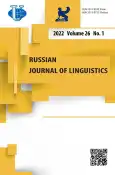“Language thinking” from the perspective of systemic linguistics
- Authors: Bakhtikireeva U.M.1, Valentinova O.I.1
-
Affiliations:
- Peoples’ Friendship University of Russia (RUDN University)
- Issue: Vol 26, No 1 (2022)
- Pages: 224-244
- Section: Articles
- URL: https://bakhtiniada.ru/2687-0088/article/view/314972
- DOI: https://doi.org/10.22363/2687-0088-30149
- ID: 314972
Cite item
Full Text
Abstract
Systemic Linguistics by Gennadii P. Melnikov, representing the interaction of linguistics and philosophy, is a system of established scholarly knowledge. An evidence-based system of knowledge that rationally certifies Melnikov's results is reflected, in particular, in the systemic typology of languages as a subfield of systemic linguistics. Like systemic linguistics in general, systemic typology of languages has not yet been sufficiently subjected to scholarly reflection. The goal of the article is to expand the scholarly discourse on the systemic approach to language. The authors focus their attention on the explanatory potential of systemic linguistics in the study of the features of thought expression in the agglutinative Kazakh language and the problem of its conveyance by means of the inflectional Russian language. The data were obtained from everyday communication, the Kazakh-Russian dictionary (2008), samples from the Kazakh-language works by Auezov, Shakhanov, Korgasbek, Suleimenov among others, and their translations into Russian. The article aims to reveal the features of dividing sense into meanings in typologically different languages. The findings substantiated and verified the provision that in typologically different languages the division of sense into meanings differs and, depending on a meaning, may be expressed by a one-word nomination or cognomination. The study has revealed the ability of an inflectional language to convey the static character of an agglutinative language and to transform this staticity into eventfulness, depending on the purpose of communication. Thus, the research has proved that the same mental content is conveyed by different means developed in languages of different morphological types.
About the authors
Uldanai M. Bakhtikireeva
Peoples’ Friendship University of Russia (RUDN University)
Author for correspondence.
Email: bakhtikireeva-um@rudn.ru
Dr. Habil. in Philology, Professor of the Department of the Russian Language and Intercultural Communication 6, Miklukho-Maklaya, Moscow, 117198, Russia
Olga I. Valentinova
Peoples’ Friendship University of Russia (RUDN University)
Email: valentinova-oi@rudn.ru
Dr. Habil. in Philology, Professor in the Department of General and Russian Linguistics 6, Miklukho-Maklaya, Moscow, 117198, Russia
References
- Aksakov, Konstantin S. 1975. Philological writings. Polnoe Sobranie. Sochinenii. V. 2. Moscow: Universitetskaya tipografiya (Katkov i K). (In Russ.)
- Boduehn de Kurteneh, Ivan A. 1963. Selected Works on Linguistics. V. 2. Moscow: AN SSSR Publ. (In Russ.)
- Dremov, Aleksei F. 2019. Zones and taxis: Locative semantics of Russian cases in terms of modern systems linguistics. RUDN Journal of Language Studies, Semiotics and Semantics 10(4). 789-809. (In Russ.) https://doi.org/10.22363/2313-2299-2019-10-4-789-809
- Zubkova, Lyudmila G. 2003. On the main linguistic work of G. P. Melnikov. In Gennadii P. Melnikov (ed.), System typology of languages: Principles. Methods. Models. 6-17. Moscow: Nauka. (In Russ.)
- Zubkova, Lyudmila G. 1999. Language as a Form. Theory and History of Linguistics. Moscow: RUDN Publ. (In Russ.)
- Lipatova, Tat'yana V. 2016. The formation of meaning and functional motivation of language units’ semantics. RUDN Journal of Language Studies, Semiotics and Semantics 1. 25-31. (In Russ.)
- Lutin, Sergei A. The origins and essence of the determinant approach to language as a system (in memory of G.P. Melnikov). RUDN Journal of Linguistics 2(8). 13-21. (In Russ.)
- Mel’nikov, Gennadii P. 1971. Principles of systemic linguistics in application to the problems of Turkic studies. Structure and History of Turkic Languages. 121-137. Moscow: Nauka. (In Russ.)
- Melnikov, Gennadii P. 1978a. Baudouin's understanding of the systemic nature of language. Language Practice and Theory of Language. 32-51. Moscow: Moscow State University Publ. (In Russ.)
- Mel'nikov, Gennadii P. 1978b. Systemology and Linguistic Aspects of Cybernetics. Moscow: Sovetskoe radio. (In Russ.)
- Mel'nikov, Gennadii P. 2000. Systemic Typology of Languages: Synthesis of Morphological Classification of Languages with Stadial. Moscow: RUDN. (In Russ.) https://www.philol.msu.ru/~lex/melnikov/meln_syst/gl2.htm#p5 (accessed 08.09.2021).
- Mel'nikov, Gennadii P. 2003. Systemic Typology of Languages: Principles. Methods. Models. Moscow: Nauka. (In Russ.)
- Pavlov, Ivan P. 1951. Full Composition of Writings: V 6. 2-nd edn. Moscow - Leningrad: AN SSSR Publ. Vol. 3. kn. 2. (In Russ.)
- Potebnya, Aleksandr A. Thought and language. Kharkov: M.V. Potebnya. (In Russ.)
- Preobrazhenskii, Sergey Yu. 2016. System analysis of verse. In Olga I. Valentinova et al. (eds.), The Systemic view as a basis for philological thought, 303-376. Moscow: Yazyki slavyanskikh kul'tur Publ. (In Russ.)
- Rudenko, DmitriiI. 1993. Linguo-philosophical paradigms: The boundaries of language and the boundaries of culture. Philosophy of Language within the Boundaries and beyond the Boundaries. 101-173. Kharkiv: Oko. (In Russ.)
- Rybakov, Mikhail A. 2016. Development of ideas about the typological similarity of languages. In Olga I. Valentinova et al. (eds.), The Systemic view as a basis for philological thought 17-136. Moscow: Yazyki slavyanskikh kul'tur Publ. (In Russ.)
- Saussure, Ferdinand de. 1933. Course of General Linguistics. Moscow: Sotsekgiz (In Russ.)
- Fedosyuk, Mikhail Yu. 2019. «Nedarom pomnit vsya Rossiya pro den’ … Borodino», or why toponyms ending on -ino, -ovo stop to be declined. Bulletin of Moscow Region State University. Series: Russian Philology 5. 333-341. (In Russ.) https://doi.org/10.18384/2310-7278-2019-5- 333-341
- Danylenko, Andrii. 2015. On the mechanisms of grammaticalization of comitative and instrumental categories in Slavic. Journal of Historical Linguistics 2(2). 267-296. https://doi.org/10.1075/jhl.5.2.03dan
- Aitmatov Chingiz T. 1998. Sobranie sochinenii: V 7-mi t. T. 3. Roman. - M.: Turkestan.
- Aitmatov, Chingiz T. & Mukhtar Sh. Shakhanov. 1996. Confession at the End of the Century. Almaty: Rauan. (In Russ.)
- Syzdykova, Rabiga G. & Kobey Sh. Husain. (eds.). Kazakh-Russian Dictionary: About 50,000 Words. Almaty: Dike-Press.
- Қy`zy`l bөltirik (Zhinaқ) Povester / Әuezov M., Қorғasbek Zh., Altaj A., Shaғataj Zh., Akhmetzhan T. Almaty`: «Arda», 2006. (In Kazakh)
- Suleimenov, Olzhas O. 1989. Essay, Journalism. Poems, Poems. Az and I. Alma-Ata: Zhalyn. (In Russ.)
- Shy`ңғy`s Ajtmatov, Mұkhtar Shakhanov. Құz basy`ndaғy` aңshy`ny`ң zary` (Ғasy`r ajry`- ғy`ndaғy` sy`rlasu): - Almaty`: Rauan, 1997. (In Kazakh)
Supplementary files










